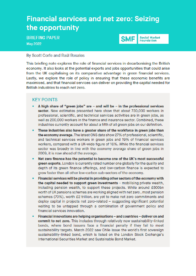This briefing explores the role of financial services in decarbonising the UK economy. Looking at the exports and jobs opportunities that could arise from the UK capitalising on its comparative advantage in green financial services, the paper calls on policymakers to ensure that financial services can provide the capital needed for British industries to reach net zero.
Key Points
- A high share of “green jobs” are and will be in the professional services sector. Combined, the professional, scientific, technical services, and financial industries currently account for a fifth of all green jobs. These industries also have a greater share of the workforce in green jobs than the economy average.
- Net zero finance can become one of the UK’s most successful green exports. London is currently number one globally for its green finance offerings, and low-carbon finance is expected to be the fastest growing low-carbon sub-sector of the economy.
- Financial services will be key in unlocking the capital needed to support green investments. This includes maximising the potential of pension funds to support green investments. At present, most pension schemes (70%), worth £2 trillion, are yet to make net zero commitments.
- Financial innovations are helping organisations – and countries – commit to and deliver on net zero. This includes through relatively new sustainability-linked bonds, where bond issuers face a financial penalty if they fail to meet sustainability targets.
Next steps for policymakers
- Create the right incentives for pension schemes to invest in green infrastructure. Policymakers must take regulatory steps to empower UK pension funds to invest more in illiquid assets such as green infrastructure and real estate. Fostering partnerships between financial services and leading educational institutions. For the innovation phase in hydrogen or new energy technologies, the UK needs business accelerators and centres of excellence backed by leading universities – helping companies to develop the needed business models and proofs of concepts to gain financial backing. Further, there is evidence that at present there is a shortage of finance professionals with sustainability-related skills; partnerships with leading educational institutions will be needed to address this gap.
- Ensuring a fairer and more consistent carbon tax framework aligned with net-zero targets, which would ensure that the value of assets better reflects their sustainability, creating stronger incentives for companies to decarbonise and investors to rebalance their portfolios towards greener opportunities. Singapore’s recent moves on carbon taxation may provide a lesson for the UK.
- Government leading the charge on sustainability-linked bonds and making the UK the global centre of sustainability-linked finance. The Chancellor should explore issuing sustainability-linked Bonds, tied to the UK’s targets on net zero. As well as creating a commitment device for the government to decarbonise Britain, it could help secure the UK as a leading hub of sustainability-linked finance.

DOWNLOAD THE BRIEFING: PDF
